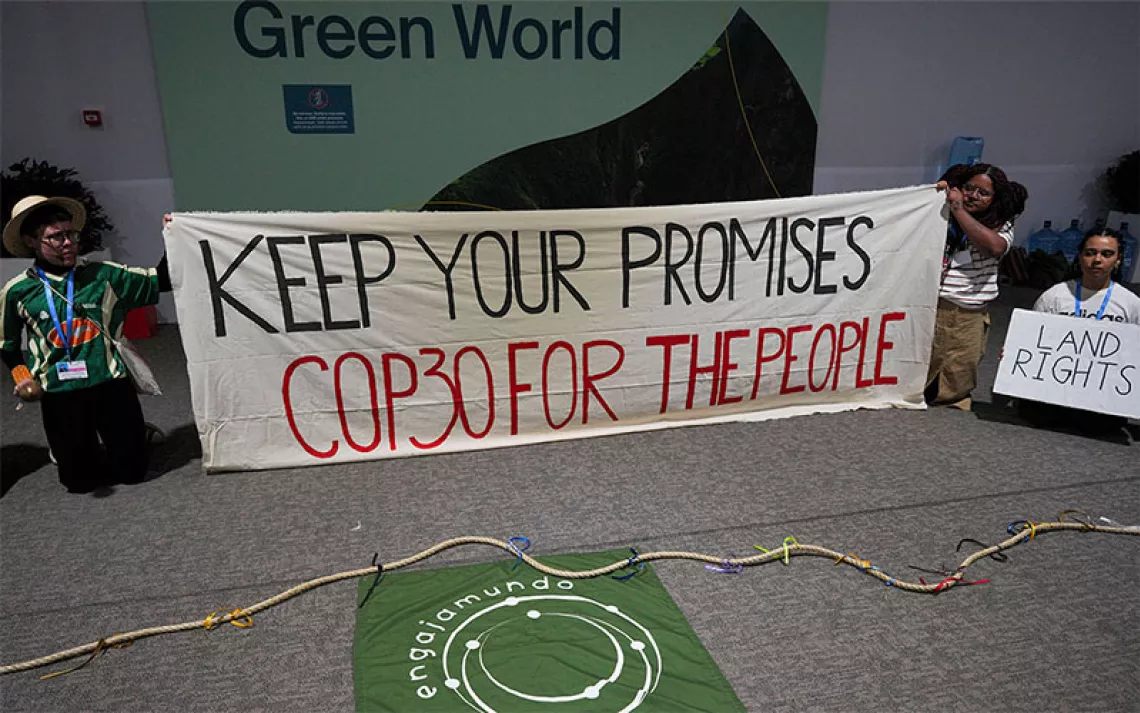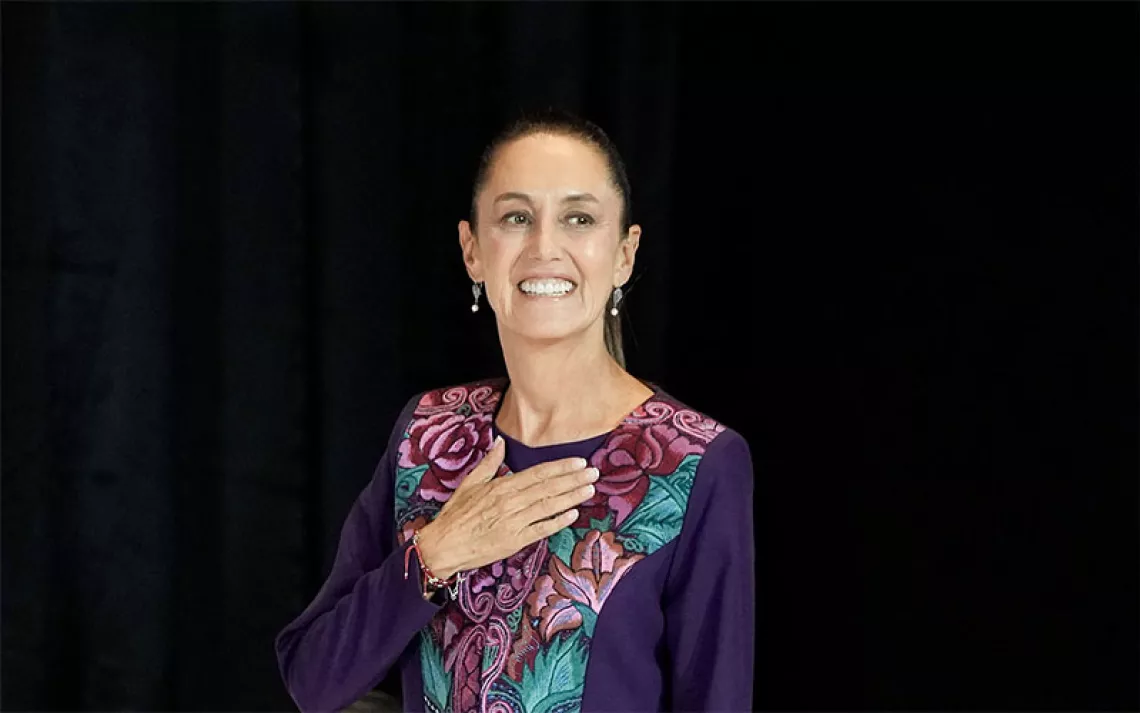Climate Justice Moves Closer to Center Stage at UN Climate Talks
The creation of a “loss and damage” fund to help cover climate change destruction is a landmark achievement

Demonstrators attend a protest at the COP27 UN Climate Summit, on November 12, 2022, in Sharm el-Sheikh, Egypt. | Photo by Peter Dejong/AP
The United Nations–sponsored climate change summit has now wrapped up in Sharm el-Sheikh, Egypt, and like many such summits, this one feels like two steps forward and one step back.
First, the good news: The Egypt climate talks may go down in history as the moment when the plight of the most climate-vulnerable countries finally occupied the center of global climate diplomacy. For the first time ever, the world’s wealthy, industrialized nations, which have contributed the most to the climate crisis, agreed to help more vulnerable countries cope with climate-related destruction, including by creating a dedicated “loss and damage” fund. While the details will be worked out next year, the creation of such a fund will provide a critical lifeline to the people who did little to create the problem and will suffer its worst consequences. The new fund is a long-overdue effort to remedy that injustice.
What does “loss and damage” mean? Think of the loss of life, cultural sites, critical infrastructure, property, agricultural sites, and entire communities due to sea level rise, flooding, drought, and more extreme weather events. As far back as 1992—when the United Nations initiated talks on global warming—many people understood that the consequences of climate would fall unevenly on various countries. The issue of loss and damage entered more officially in climate diplomacy in 2007, when the Bali Action Plan suggested that wealthy nations take (unspecified) steps to assist “particularly vulnerable” countries. For too long, wealthy countries have tried to dodge this hard conversation and have procrastinated on providing funds to cover climate-related damages. The COP27 talks marked the end of that intolerable delay.
“A mission 30 years in the making has been accomplished,” said Molwyn Joseph, the minister from Antigua and Barbuda and the chair of the group of small island nations. “Our ministers and negotiators have endured sleepless nights and endless days in an intense series of negotiations—but after the pain comes the progress.”
And the bad news? In the final hours of the talks, a group of oil-producing nations halted an effort to include in the final text a clear statement calling for the phasedown of coal, oil, and methane gas use. So, in short, the globe’s governments still aren’t moving fast enough to live up to the goals of the Paris Agreement and stop burning the fossil fuels that are warping the climate and causing massive destruction.
But there were signs of forward motion from the United States.
During his short visit to the climate talks, President Joe Biden committed to doubling the US pledge to the Adaptation Fund, which helps vulnerable countries build resilience to climate-change-related destruction. The president also launched a new initiative to help Egypt deploy 10 gigawatts of clean energy and retire 5 gigawatts of methane gas generation, and he announced the creation of a Climate Gender Equity Fund and an Indigenous Peoples Finance Access Facility.
Biden was able to come to the UN talks with real credibility on US climate action—which was lacking during the past few climate conferences (especially during the Trump administration). He pointed to the passage of the Inflation Reduction Act (IRA), the largest climate bill in history, and the Senate's ratification of the Kigali Amendment as key indicators of US progress on climate. The Kigali Amendment aims to gradually reduce the consumption and production of hydrofluorocarbons (HFCs), which are potent greenhouse gasses.
Additionally, Biden touted the long-awaited Environmental Protection Agency rules on methane, which aim to establish strong, commonsense protections against methane and other harmful pollution from the oil and gas industry. Methane has more than 80 times the warming power of carbon dioxide over 20 years.
Biden also highlighted a new rule requiring major federal contractors to publicly disclose their greenhouse gas pollution and to set targets for its reduction in line with the 2015 Paris Climate Agreement. If this sounds like a down-in-the-weeds detail, think of the hundreds of billions of dollars that the US government annually spends on contractors and the ripple effect that this rule will have in the market when all those private contractors begin to change their business practices.
One announcement that received skepticism is a new carbon credit trading program called the Energy Transition Accelerator. Backed by companies like PepsiCo and Microsoft, this fund will allow corporations to offset the carbon pollution of their suppliers by helping underwrite the clean energy transition in developing nations. It sounds good, but it could be ripe for misuse. “While creative and innovative solutions to the biggest crisis of our time are always welcome, carbon markets have, at best, a fraught record of delivering real carbon reductions, and there are a number of ways that this program could go wrong,” my colleague Cherelle Blazer, senior director of the Sierra Club’s International Climate and Policy Campaign, said in response to this notion.
In summary, much more action is required to stave off the worst effects of climate change. Much more work has to be done to assist vulnerable countries with climate change adaptation so that they can avoid suffering loss and damages in the first place.
Now we need the United States and other major polluters to step up and make real, binding commitments to the agreed-to loss and damage fund. In the United States, that will require a vote by Congress to appropriate the money. This will pose a real moral challenge to the incoming Republican-controlled House of Representatives. Are House Republicans ready to help vulnerable nations cover the costs of the climate destruction those poorer and more vulnerable nations had little role in causing?
Let’s hope so. Because anything short of such global climate justice would be an unnecessary loss and unforgivable damage.
 The Magazine of The Sierra Club
The Magazine of The Sierra Club



